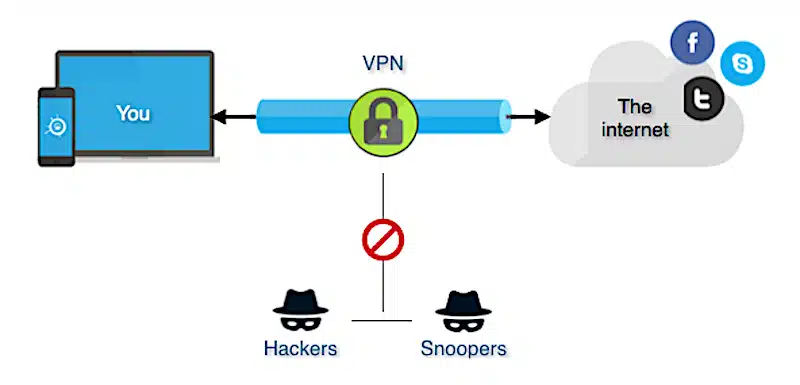An introduction to Virtual Private Network (VPN)

Virtual Private Network (VPN) is what?
VPN Technology refers to a service that create a secure channel between your device and the internet through encryption of your connection. This is often called a ‘tunnel’ that guarantees your anonymity – browsing, makes transfers, etc. VPNs have become popular to improve security, privacy and unblock content location around the world. A VPN hides the IP address of one’s computer and makes a user seem like they are browsing from a different geographical location adding a level of security and convenience.
How Does a VPN Work?
VPNs work through the interception of an internet connection and then sending it through the server of the VPN service. Whenever you begin using a VPN, your device sends information to this server or, more accurately, passes its information through the server as it connects to other websites on the internet.
Since its function is to protect your identity this steps mask the IP address with the server’s IP address. Open VPN, L2Tp/IPsec or Wire Guard have various methods of encrypting the information so that even if a hacker is trailing the data, they cannot understand it. VPNs also can also overcome local network limitations allowing a user to visit restricted websites and services.
Key Benefits of Using a VPN
VPN has numerous benefits for both the users and enterprises. First, it helps to increase online anonymity as well as to protect data with the help of encryption and IP address masking. Second, VPNs enhance security especially when using public internet connection which is full of risks to essential information such as passwords and credit details.
Third, they let you have restricted geographic content, allowing users to stream services or visit specific sites that belong to locations they are restricted from accessing. Lastly, VPNs helps in minimizing chances of tracking by advertisers online and stopping internet service providers from throttling network bandwidth to provide a smooth browsing.
Types of VPNs: Which One is Right for You?
VPN basically comes as different types of services based on the requirement of theIMITER that uses them. These are special VPNs meant for the individual use since they are used when someone needs privacy and want to access certain site. Business VPNs are meant for enterprises and allow remote workplace connection to the business network. Site-to-Site VPNs are used to interconnect several office branches in order to support smooth communication between them.
Mobile VPNs help to provide the security of connection on smart phones and tablets. Your needs may include better privacy, personal, or business needs, or security for mobile devices, and knowing these will make it easier to select the right VPN. Both have advantages and therefore the assessment of these priorities is important when making a choice.
Common Use Cases for VPNs
VPNs are quite a flexible type of networks that can be used for many purposes. VPN is used for unblocking contents or for protecting ones data when using acccessing the Internet on cyber cafes. They are used by the remote workers to enable them access the company server securely.
The main idea of VPN usage by privacy-minded persons is to conceal their personally identifiable information from ISPs and advertisers. This enabled student and researchers’ break geographical barriers in order to access academic materials. Furthermore, through the use of VPNs, the internet may be accessed astride since certain governments have banned some web content their citizens from accessing. Be it for protection, privacy or access, VPN are some of the essential tools that one will require in the 21st century.
How to select the Best VPN Provider
Selecting the best VPN is NOT a random decision, and therefore there are certain factors that need to be put into consideration. Be on the look out for a provider with high levels of encryption and strictly follow no logs policy. Assess the server network—bigger and distributed network of the servers provides a better performance as well as availability of content. Verify the compatibility of software and your devices and the operating system you are running.
Consider the speed, because it can affect browsing or even streaming. Browse reviews and try the customer service eagerness. And finally, examine the plans and their costs to make sure that the service fully corresponds to the requirements and your budget. Zastosowanie dobrej usługi VPN zabezpieczenia internetowego sektorów przesyłania danych powinny posiadać funkcjonalność, niezawodność i atrakcyjność cenową.
Virtual Private Networks Security and Encryption will be discussed in this paper.
Basically, VPN security is based on encryption mechanisms that protect information from interception. They include; Open VPN that is well known for its speed and security and Wire VPN that is known for its enhanced security and speed. VPNs employ technologies such as AES-256 to encode the data, so that anyone intercepting such data on the internet will not understand it since it needs to be decrypted using a specific key.
The no logs policy makes sure that the provider does not retain the activity logs of the user and adds to privacy. The security measures employed in the working VPN need to be effective since people engage in browsing the internet from public domain connections.
The VPN in the context of the internet privacy issues
VPNs are crucial in the protection of those accessing the Internet since they hide IP address and or encrypt the traffic. This anonymity reduce the activities of website, advertisers, and ISPs from tracking your activities. VPNs also assist in avoiding spying and data gathering performed by the governments or other organizations.
In the same way, identity theft becomes a thing of the past once a user is using a VPN since his or her data is protected during online transactions. VPN services allow one to reclaim autonomy over their online identities and minimize all the dangers of tracking while/blocking web access to specific sites.
VPNs for Businesses
VPN is adopted in businesses in order to facilitate communication that is secure from hackers and to protect information. Remote teams can work with the company assets without having the team vulnerable to the outside world. Site-to-Site VPNs connect different office locations, it allows LAN to be extended from one location to the other.
VPNs also offer users security against cybercrimes including phishing and data theft because all messages transmitted through the VPNs are encrypted. Also, with geographical barriers being avoided, the business can avail the global resources appropriately and can pursue its market research. By adding more security as well as flexibility, VPNs provide protection to company data while boost the business performance as well as business operations.
Future of VPNs: Trends and Innovations
It is now possible now to predict how VPNs are going to transform with new technologies coming into the market. AI is being plugged into bolster threat identification and to optimize users’ interactions. Quantum escalation is a promising future, that will help overcome challenges created by quantum computing.
Since dVPNs are built in a peer-to-peer manner, enhancing privacy, their adoption is on the rise. Also, VPN services started expanding to face the steady rise of Internet of Things (IoT) devices, making connections secure on every OS. While the threats that VPNs counter become ever more intricate, the service will further enhance and add new features for protecting consumers’ identities and information.
Secure Browsing to know about its importance.
When surfing the web, it ensures that any data you input is safe from anything that may be out in the cyberspace. VPNs protect your connection hence making it impossible for hackers to get at your login details. This is especially important on shared networks where PDAs may be connected to open Wi-Fi networks that compromise the plans and data on individuals.
Besides that, since VPN masks IP address, it also stops the website tracking your behavior online. It rises up as a way of ensuring you have a safe internet by reducing the risks that come with stealing of your identity, breach of data, and wrong surveillance.
The Research find out the differences in between the Free and Paid VPN Services.
Although free VPNs are appealing, they mostly have drawbacks, which should be considered. Free services are not very secure, they are slow and some services may not allow many users in a specific server. However, there are free VPNs that make their money through advertisements or through the sale of a user’s data and information.
In contrast, there are those with paid subscriptions and these provide stronger security protocols, faster connectivity and more server options. They also offer efficient customer service as well as other extra capabilities such as an antivirus solution. lost except for the free ones but to get a better privacy and performance, the paid ones offer the best.
How to Get Connected on a VPN for Your Gadgets
Connection to a VPN is relatively easy to do. To start with, one selects a good VPN service provider and pays for the service. Get the VPN app appropriate for the Operating System used in your device. Download the application and enter using your credentials. Choose a server to connect and begin hosting to it.
Almost every app has additional options, including the choice of the encryption algorithm or the activation of a kill switch. After connection, your internet usage is secure and unaffected and your browsing is confidential. Continuing improvement of the app guarantees its effective functioning and user protection.
Potential Limitations of VPNs
However, it is also important to know that VPNs hold a number of drawbacks. They may also cause a slight deduction in the Internet speed because of encryption and passage through other channels. It is important to note that some websites may actually ban VPN traffic entirely, including when you are connected.
Besides, not all VPNs bring privacy, as the provider may store logs in case they do not adhere to ‘no-logs’ policy. Most free VPNs are not secure, and they offer very few options. VPNs also do not protect their users against malware or phishing attacks. These limitations should not be a surprise to the users and they should also agree that there’s no perfect security solution; therefore, they should embrace other measures for better security.
The coming of more advanced technologies and the development of next generations of VPNs
The technological advancements are defining the development of VPNs. Artificial intelligence is also progressing due to quantum computing technology that makes encryption standards ready for the future. VPN services based on the blockchain are appearing with decentralized networks and higher security and anonymity.
VPN is enhanced by the deployment of AI and machine learning in predicting needs of its users and identifying those threats. With more IoT devices available in the market, VPN is now positioning itself to protect the new stratum of interconnected systems. Which proves the further evolution of VPNs, which have become essential tools in the modern world of information technology.







